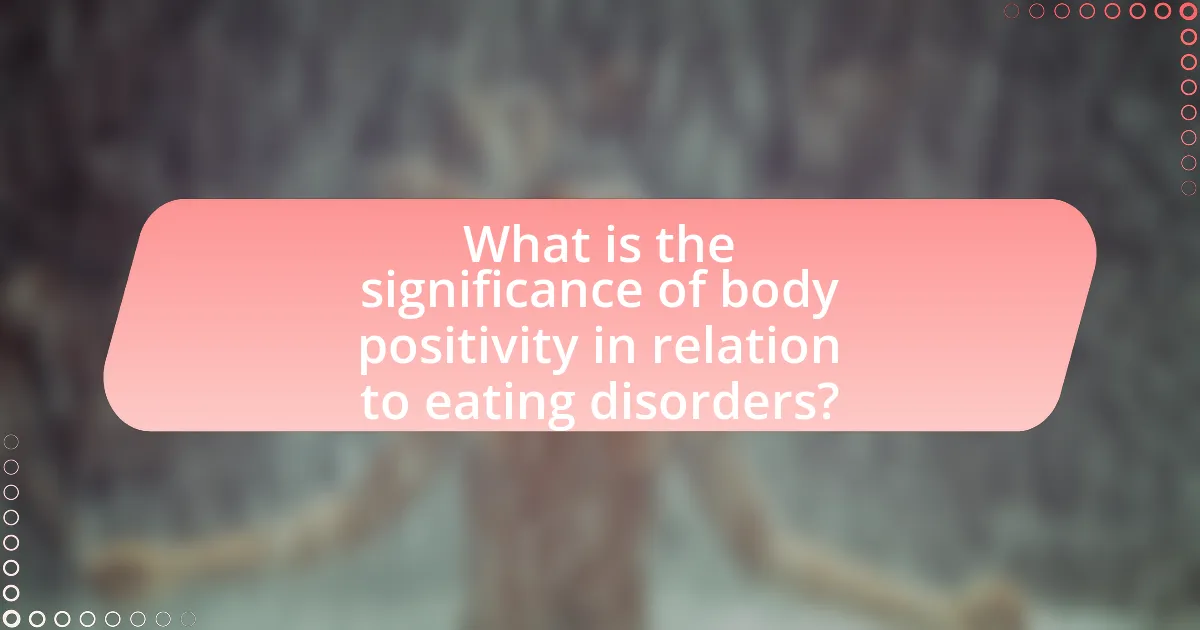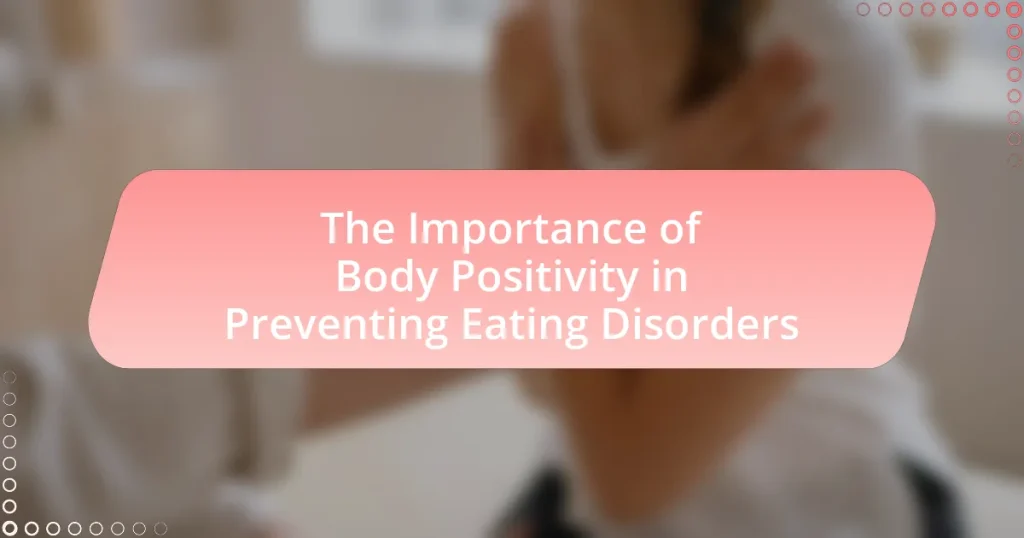The article focuses on the significance of body positivity in preventing eating disorders, emphasizing its role in promoting self-acceptance and challenging societal beauty standards. It highlights research indicating that individuals who embrace body positivity are less likely to engage in harmful dieting behaviors and more likely to maintain a healthier relationship with food. The article discusses the psychological effects of negative body image, the benefits of positive body image on mental well-being, and the importance of fostering body positivity in various settings, including schools and media. Additionally, it outlines practical strategies for individuals to cultivate body positivity and the resources available for those struggling with body image issues.

What is the significance of body positivity in relation to eating disorders?
Body positivity is significant in relation to eating disorders as it promotes self-acceptance and challenges societal beauty standards, which can mitigate the risk of developing such disorders. Research indicates that individuals who embrace body positivity are less likely to engage in harmful dieting behaviors and more likely to have a healthier relationship with food. A study published in the journal “Body Image” found that body positivity interventions can lead to reduced body dissatisfaction, a key factor in the onset of eating disorders. By fostering an environment that values diverse body types, body positivity serves as a protective factor against the psychological distress that often contributes to eating disorders.
How does body positivity influence self-image and mental health?
Body positivity significantly enhances self-image and mental health by promoting acceptance of diverse body types and reducing stigma associated with appearance. This acceptance leads to improved self-esteem, as individuals feel more comfortable in their own skin, which is supported by research indicating that body positivity can decrease symptoms of anxiety and depression. A study published in the journal “Body Image” by Tylka and Wood-Barcalow (2015) found that individuals who embrace body positivity report higher levels of life satisfaction and lower levels of disordered eating behaviors. Thus, body positivity serves as a protective factor against negative mental health outcomes, fostering a healthier relationship with one’s body and overall well-being.
What are the psychological effects of negative body image?
Negative body image can lead to significant psychological effects, including increased levels of anxiety, depression, and low self-esteem. Research indicates that individuals with a negative perception of their bodies are more likely to experience mental health issues; for instance, a study published in the journal “Body Image” found that 70% of women reported feeling anxious about their appearance, which correlates with depressive symptoms. Furthermore, negative body image can contribute to disordered eating behaviors, as individuals may resort to extreme dieting or exercise to achieve an idealized body shape, further exacerbating mental health challenges.
How can positive body image promote mental well-being?
Positive body image promotes mental well-being by enhancing self-esteem and reducing anxiety and depression. Individuals with a positive perception of their bodies are more likely to engage in healthy behaviors, such as regular exercise and balanced nutrition, which contribute to overall mental health. Research indicates that a positive body image is associated with lower levels of psychological distress and higher life satisfaction. For instance, a study published in the Journal of Health Psychology found that individuals who embrace body positivity report significantly lower rates of depression and anxiety compared to those with negative body image perceptions. This correlation underscores the importance of fostering a positive body image as a protective factor against mental health issues.
Why is body positivity essential in preventing eating disorders?
Body positivity is essential in preventing eating disorders because it promotes self-acceptance and reduces the stigma associated with body image. Research indicates that individuals who embrace body positivity are less likely to engage in harmful dieting behaviors and more likely to maintain a healthy relationship with food. A study published in the journal “Body Image” found that body positivity interventions significantly decreased disordered eating behaviors among participants, highlighting the protective effect of positive body image on mental health. By fostering an environment where diverse body types are celebrated, body positivity helps mitigate the societal pressures that contribute to the development of eating disorders.
What role does societal pressure play in body image issues?
Societal pressure significantly contributes to body image issues by promoting unrealistic beauty standards through media, peer influence, and cultural norms. Research indicates that exposure to idealized body types in advertising and social media can lead to dissatisfaction with one’s own body, particularly among adolescents and young adults. A study published in the journal “Body Image” found that individuals who frequently engage with social media platforms are more likely to experience negative body image and disordered eating behaviors. This correlation underscores the impact of societal expectations on personal self-esteem and body perception, highlighting the need for body positivity initiatives to counteract these harmful influences.
How can body positivity counteract these societal pressures?
Body positivity can counteract societal pressures by promoting self-acceptance and challenging unrealistic beauty standards. This movement encourages individuals to embrace their bodies regardless of size, shape, or appearance, which can reduce the internalized stigma associated with societal ideals. Research indicates that body positivity can lead to improved mental health outcomes, as individuals who practice self-acceptance are less likely to engage in disordered eating behaviors. A study published in the journal “Body Image” found that individuals who participated in body positivity initiatives reported lower levels of body dissatisfaction and a decreased likelihood of developing eating disorders. Thus, body positivity serves as a powerful tool in mitigating the harmful effects of societal pressures related to body image.
What are the key principles of body positivity?
The key principles of body positivity include acceptance of all body types, promoting self-love, and challenging societal beauty standards. Acceptance of all body types emphasizes that every individual, regardless of size, shape, or appearance, deserves respect and dignity. Promoting self-love encourages individuals to appreciate their unique qualities and foster a positive self-image. Challenging societal beauty standards involves questioning and resisting the narrow definitions of beauty perpetuated by media and culture, which can lead to harmful comparisons and self-criticism. These principles are supported by research indicating that body positivity can reduce the risk of developing eating disorders by fostering a healthier relationship with one’s body and improving mental well-being.
How does acceptance of diverse body types contribute to body positivity?
Acceptance of diverse body types significantly contributes to body positivity by fostering an inclusive environment that values all forms of physical appearance. This acceptance helps individuals recognize that beauty is not confined to a specific size or shape, which can reduce feelings of inadequacy and promote self-love. Research indicates that exposure to diverse body representations can lead to improved body image and decreased risk of eating disorders, as individuals feel less pressure to conform to unrealistic standards. For instance, a study published in the journal “Body Image” found that individuals who engage with media showcasing a variety of body types report higher levels of body satisfaction and lower levels of disordered eating behaviors. Thus, embracing diverse body types is essential for cultivating a positive body image and preventing eating disorders.
What practices can individuals adopt to foster body positivity?
Individuals can foster body positivity by practicing self-acceptance and engaging in positive self-talk. Self-acceptance involves recognizing and appreciating one’s body as it is, which can reduce negative body image and promote mental well-being. Positive self-talk encourages individuals to challenge negative thoughts about their appearance and replace them with affirming statements. Research indicates that these practices can significantly improve self-esteem and reduce the risk of developing eating disorders, as highlighted in a study published in the Journal of Eating Disorders, which found that individuals who engage in self-acceptance are less likely to experience body dissatisfaction.

How can body positivity be promoted in various settings?
Body positivity can be promoted in various settings through education, representation, and supportive environments. Educational programs in schools can teach students about body diversity and self-acceptance, which has been shown to reduce the risk of eating disorders. For instance, a study published in the Journal of Eating Disorders found that body image education significantly improved students’ self-esteem and body satisfaction. In media and advertising, increasing representation of diverse body types can challenge societal beauty standards, as research indicates that exposure to varied body images can enhance body acceptance among viewers. Additionally, creating supportive environments in workplaces and community centers, where discussions about body image are encouraged and stigma is reduced, fosters a culture of acceptance and well-being. These strategies collectively contribute to a more inclusive understanding of body positivity across different settings.
What role do schools play in promoting body positivity?
Schools play a crucial role in promoting body positivity by creating an inclusive environment that fosters self-acceptance and respect for diverse body types. They implement educational programs that address body image issues, helping students understand the impact of societal standards on self-esteem. Research indicates that comprehensive health education, which includes discussions on body image and media literacy, can significantly reduce the prevalence of eating disorders among adolescents. For instance, a study published in the Journal of School Health found that students who participated in body positivity initiatives reported higher self-esteem and lower levels of body dissatisfaction. By integrating body positivity into the curriculum and school culture, schools can effectively combat negative body image and support mental health among students.
How can educational programs address body image issues?
Educational programs can address body image issues by incorporating curricula that promote body positivity and self-acceptance. These programs can include workshops, discussions, and activities that challenge societal beauty standards and encourage critical thinking about media representations of body image. Research indicates that educational interventions focused on body image can lead to improved self-esteem and reduced body dissatisfaction among participants, as evidenced by a study published in the Journal of Eating Disorders, which found that students who participated in body image education reported a significant decrease in negative body image perceptions. By fostering an environment that values diversity in body shapes and sizes, educational programs can effectively combat the stigma associated with body image issues and contribute to the prevention of eating disorders.
What initiatives can schools implement to support body positivity?
Schools can implement initiatives such as body positivity workshops, inclusive curriculum changes, and peer support programs to support body positivity. Body positivity workshops can educate students about self-acceptance and the diversity of body shapes and sizes, fostering a more inclusive environment. Inclusive curriculum changes can incorporate discussions about media literacy, helping students critically analyze societal beauty standards and their impact on self-esteem. Peer support programs can create safe spaces for students to share experiences and encourage one another, which has been shown to reduce feelings of isolation and promote mental well-being. Research indicates that such initiatives can significantly lower the risk of developing eating disorders by promoting a healthier body image among students.
How can media influence body positivity?
Media can influence body positivity by promoting diverse body representations and challenging traditional beauty standards. When media outlets feature individuals of various shapes, sizes, and backgrounds, they help normalize different body types, which can lead to increased acceptance and self-esteem among audiences. Research indicates that exposure to body-positive media can reduce body dissatisfaction and improve mental health outcomes. For example, a study published in the journal “Body Image” found that participants who engaged with body-positive content reported higher levels of body satisfaction and lower levels of disordered eating behaviors. This demonstrates that media plays a crucial role in shaping societal perceptions of body image and can foster a more inclusive and positive environment.
What are the effects of media representation on body image?
Media representation significantly influences body image by shaping societal standards of beauty and self-worth. Research indicates that exposure to idealized body types in media can lead to negative body image, increased dissatisfaction, and a higher risk of developing eating disorders. For instance, a study published in the journal “Body Image” found that women who viewed thin-ideal images reported greater body dissatisfaction and a desire to lose weight. Furthermore, the prevalence of edited and unrealistic portrayals of bodies in advertising and social media exacerbates these effects, leading individuals to compare themselves unfavorably to these representations. This cycle of comparison and dissatisfaction can contribute to mental health issues, including anxiety and depression, highlighting the critical need for diverse and realistic media portrayals to promote body positivity and prevent eating disorders.
How can media campaigns promote body positivity effectively?
Media campaigns can promote body positivity effectively by showcasing diverse body types and challenging societal beauty standards. By featuring individuals of various shapes, sizes, and backgrounds, campaigns can foster inclusivity and help audiences recognize that beauty is not limited to a specific appearance. Research indicates that exposure to diverse representations in media can reduce body dissatisfaction and improve self-esteem among viewers. For instance, a study published in the journal “Body Image” found that participants who viewed advertisements featuring a range of body types reported higher levels of body satisfaction compared to those who viewed traditional, narrow representations. This evidence supports the effectiveness of media campaigns in promoting body positivity and preventing eating disorders.

What strategies can individuals use to cultivate body positivity?
Individuals can cultivate body positivity by practicing self-acceptance, engaging in positive self-talk, and surrounding themselves with supportive communities. Self-acceptance involves recognizing and embracing one’s unique body shape and size, which has been shown to improve mental health and reduce the risk of eating disorders. Positive self-talk encourages individuals to challenge negative thoughts about their bodies, fostering a healthier self-image. Research indicates that social support plays a crucial role in body positivity; individuals who engage with communities that promote body diversity and acceptance report higher levels of body satisfaction.
How can mindfulness practices enhance body positivity?
Mindfulness practices enhance body positivity by promoting self-acceptance and reducing negative self-judgment. Engaging in mindfulness encourages individuals to focus on the present moment and develop a non-judgmental awareness of their thoughts and feelings about their bodies. Research indicates that mindfulness can lead to improved body image and reduced disordered eating behaviors. For instance, a study published in the journal “Body Image” found that participants who practiced mindfulness reported higher levels of body satisfaction and lower levels of body shame. This evidence supports the notion that mindfulness can effectively foster a more positive relationship with one’s body, thereby contributing to overall mental well-being and potentially preventing eating disorders.
What techniques can individuals use to practice mindfulness regarding their bodies?
Individuals can practice mindfulness regarding their bodies through techniques such as body scanning, mindful movement, and breath awareness. Body scanning involves focusing attention on different parts of the body sequentially, which enhances awareness of physical sensations and promotes acceptance. Mindful movement, such as yoga or tai chi, encourages individuals to connect with their bodies through intentional movements, fostering a sense of presence and appreciation for physical capabilities. Breath awareness involves concentrating on the breath, helping to ground individuals in the present moment and reduce anxiety related to body image. Research indicates that these mindfulness practices can improve body image and reduce the risk of eating disorders by promoting a healthier relationship with one’s body.
How does self-compassion relate to body positivity?
Self-compassion significantly enhances body positivity by fostering a kinder and more accepting attitude towards oneself. Research indicates that individuals who practice self-compassion are less likely to engage in negative self-talk and body shaming, which are common barriers to body positivity. A study published in the journal “Body Image” by Neff and Vonk (2009) found that self-compassion is positively correlated with body appreciation and negatively correlated with body dissatisfaction. This suggests that cultivating self-compassion can lead to a healthier body image, thereby contributing to the prevention of eating disorders.
What are some practical tips for fostering a positive body image?
To foster a positive body image, individuals should practice self-compassion, engage in positive self-talk, and limit exposure to negative media influences. Self-compassion involves treating oneself with kindness and understanding during moments of perceived inadequacy, which has been shown to enhance overall well-being. Positive self-talk encourages individuals to replace critical thoughts with affirming statements, promoting a healthier self-perception. Additionally, limiting exposure to media that promotes unrealistic body standards can reduce feelings of inadequacy and improve body satisfaction, as studies indicate that media consumption is linked to body dissatisfaction.
How can individuals challenge negative thoughts about their bodies?
Individuals can challenge negative thoughts about their bodies by practicing cognitive restructuring techniques, which involve identifying and reframing distorted beliefs. Research indicates that cognitive-behavioral therapy (CBT) effectively reduces body dissatisfaction by helping individuals recognize negative thought patterns and replace them with more balanced perspectives. For instance, a study published in the journal “Body Image” by Cash and Smolak (2011) found that individuals who engaged in CBT reported significant improvements in body image and self-esteem. By actively questioning the validity of negative thoughts and focusing on positive attributes, individuals can foster a healthier self-image and mitigate the risk of developing eating disorders.
What role does social support play in enhancing body positivity?
Social support plays a crucial role in enhancing body positivity by providing individuals with affirmation and acceptance, which can counteract negative body image perceptions. Research indicates that individuals who receive positive reinforcement from friends, family, and peers are more likely to develop a healthy self-image and engage in body-positive behaviors. For instance, a study published in the journal “Body Image” by Tiggermann and Slater (2014) found that social support significantly correlates with higher levels of body satisfaction among adolescents. This support helps mitigate the impact of societal pressures and promotes resilience against body dissatisfaction, ultimately contributing to the prevention of eating disorders.
What resources are available for those struggling with body image issues?
Resources available for those struggling with body image issues include therapy, support groups, and educational materials. Therapy options such as cognitive-behavioral therapy (CBT) have been shown to effectively address negative body image by helping individuals reframe their thoughts and beliefs about their appearance. Support groups, both in-person and online, provide a community for sharing experiences and coping strategies, which can foster a sense of belonging and understanding. Educational materials, including books and online resources from organizations like the National Eating Disorders Association (NEDA), offer information on body positivity and strategies for improving self-esteem. These resources collectively contribute to a supportive framework for individuals seeking to improve their body image and prevent related eating disorders.
How can therapy and counseling support body positivity?
Therapy and counseling can support body positivity by helping individuals develop a healthier self-image and challenge negative beliefs about their bodies. Through techniques such as cognitive-behavioral therapy, clients learn to identify and reframe distorted thoughts related to body image, which can reduce feelings of shame and inadequacy. Research indicates that therapy can lead to significant improvements in body satisfaction; for instance, a study published in the Journal of Counseling Psychology found that participants who engaged in therapy reported increased body appreciation and decreased disordered eating behaviors. This evidence underscores the effectiveness of therapeutic interventions in fostering a positive relationship with one’s body, ultimately contributing to the prevention of eating disorders.
What online communities promote body positivity and support?
Online communities that promote body positivity and support include platforms such as Instagram, Tumblr, and Reddit. These platforms host various groups and hashtags dedicated to body positivity, where users share personal stories, images, and resources that encourage acceptance of diverse body types. For instance, the hashtag #BodyPositivity on Instagram has millions of posts, showcasing a wide range of body shapes and sizes, which helps foster a supportive environment. Additionally, Reddit has specific subreddits like r/bodypositivity, where members engage in discussions and share experiences related to body image and self-acceptance. These communities play a crucial role in combating negative body image and reducing the risk of eating disorders by promoting a culture of acceptance and support.


